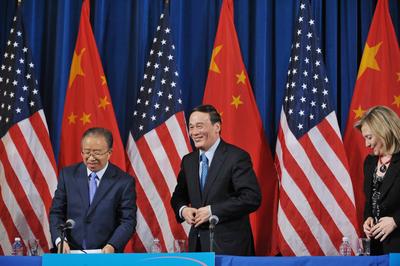In other words, the factionalisation of the top leadership and the fragmentation of decision-making procedures signal that a new kind of politics is emerging. It may not be democratic, but it is relatively more open and oriented toward transparency. This year, a new generation of leaders will move into key government and party positions in China. The changeover is being watched closely around the world, and it will only be the second time a peaceful changeover has taken place in the history of the Chinese Communist Party (CCP) — if it goes to plan. The leadership wants the world to view the Chinese government as responsible, accountable and legitimate, and the entire government has been mobilised to ensure the 18th National Congress, where the handover will take place in October, is convened successfully.
But as a result of the more competitive environment, the congress may not be as smooth and triumphant as the leadership might hope, and appointments to the Politburo Standing Committee may not be made easily. Xi Jinping and Li Keqiang may still be ‘allowed’ to become general secretary and premier, as any changes here might create an unforgivable sense of political instability in China, but other appointments may remain unknown for some time. Some form of popular decision making among central committee members is also not out of the question.
The smooth transition seemed to be going to plan until February 6 when Wang Lijun, the vice mayor of Chongqing, walked into the American Consulate General in Chengdu to request asylum. But, after 24 hours, Wang was not granted asylum. The central government, embarrassed at the kerfuffle, pledged to investigate Wang’s actions. Meanwhile, his boss, Bo Xilai, well known for his ferocious campaign to try to elevate himself to the Standing Committee of the CCP Politburo since he became Party Secretary of the city in 2007, immediately turned on the spin machine. Bo declared that Wang was under considerable stress due to his heavy workload and might be mentally unstable. Wang was subsequently granted administrative leave.
Both Bo and Huang Qifan, the mayor of Chongqing, attempted to fight off any attempt to take Bo out of the lineup for the CCP’s power transfer. The efforts appeared to be working until Wen Jiabao, in answering a reporter at a press conference, declared that the future of Chongqing’s leadership should depend on why Wang went into the US Consulate General. He pledged that the central government would investigate the case, and that its result must be able to stand any legal and historical test.
The next day, Xinhua News Agency announced that Bo would no longer be party secretary of Chongqing, and that Zhang Dejiang, a member of the Politburo and vice premier of the State Council, had taken his place. Bo, the ever eloquent and charismatic leader, was not publicly heard from again, although allegations of Bo’s misconduct (and that of his wife, Gu Kailai) continue to be reported in the media. Mayor Huang, who had fiercely defended Bo and his achievements, declared the next day that he supported the central government’s decision. Several ultra-leftist websites, including Utopia, were unexpectedly shut down. And citizens in Chongqing suddenly found they could no longer sing revolutionary songs which had been repopularised by Bo in public squares.
The Maoists (also known as the New Left) have suffered a huge setback as a result of Bo’s removal. Maoists agree that China faces many challenges due to rampant corruption and the growing gap between rich and poor. But they believe the most effective way to fight corruption and realise social justice is not through the rule of law and other democratic measures, rather through more state intervention and even political suppression. They tend to suspect that all political reform attempts are encouraged and funded by Western enemies, and regard reformers as traitors to the people. The Maoists will fight back hard, using any means available.
While there are unmistakable signs that the CCP’s legitimacy is weakening, the leadership can still make and enforce political decisions. Rumours of the CCP’s imminent meltdown were unfounded. However, politics as usual has been riddled with bullets. One of the shooters is Wen Jiabao himself. Wen has admitted to a lack of achievement in the political-reform sector, which he attributed to being constrained by special-interest groups, the unreasonable governance system, and a Cultural Revolution mentality. His declaration that China’s economic reform cannot be sustained without political reform may be forcing the Party to sit up and take note.
It was at the 13th Party Congress in 1987 when an action plan for China’s political reform was announced by Zhao Ziyang. He was dismissed in the wake of the 1989 Tiananmen Square incident. Whatever the challenges now, China can hardly afford to wait another 23 years to deliver on such reforms.
Yawei Liu is Director of the China Program at The Carter Center.


This uncertainty is inherent in a non-transparent political system and not related to one incident.